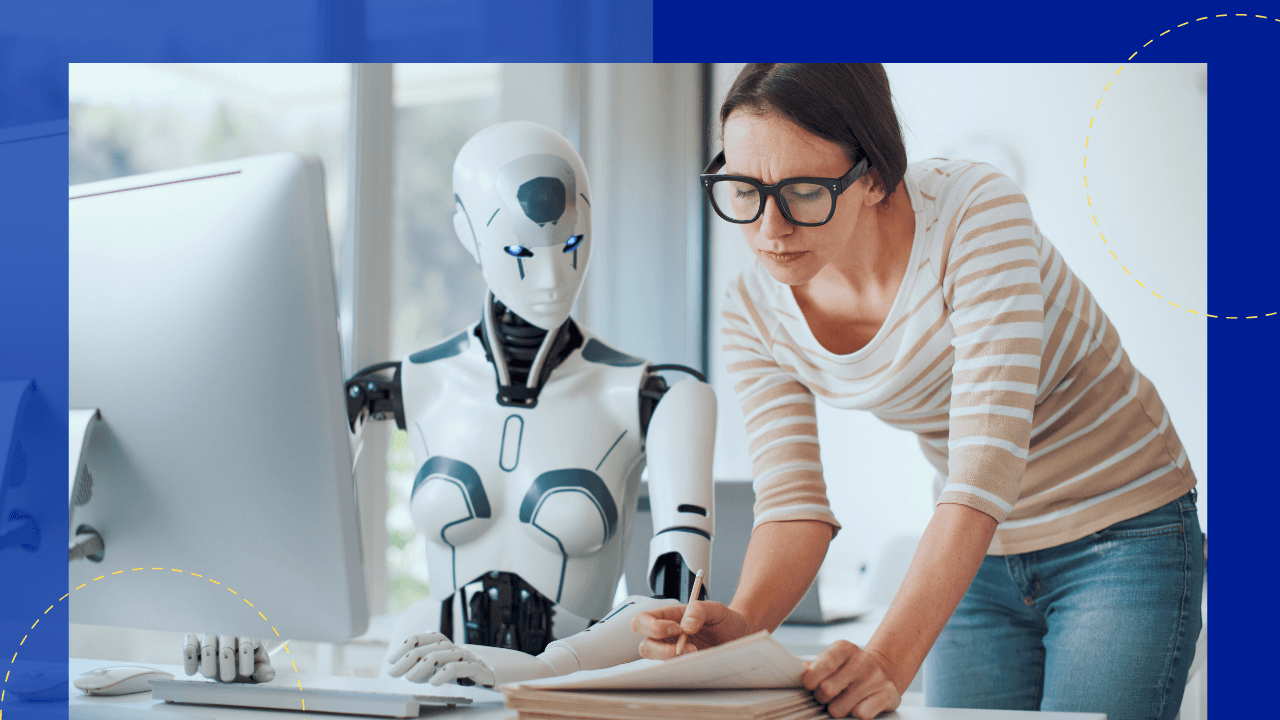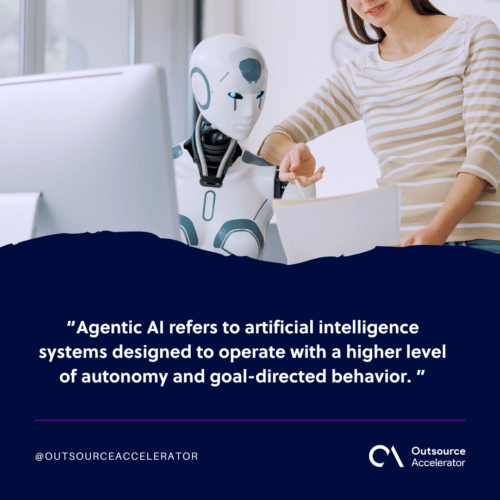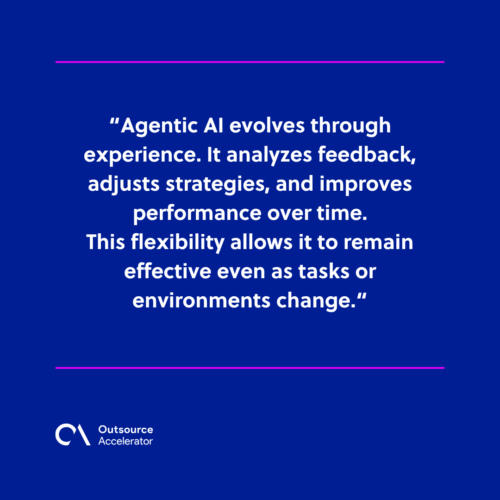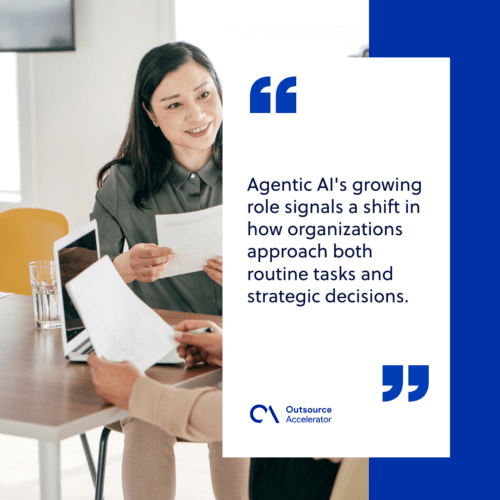What is Agentic AI: Could it be your next coworker?

Integrating artificial intelligence (AI) into daily tasks has become a strategic advantage in the modern workplace.
McKensy’s recent survey reveals that 92% of companies plan to invest more in generative AI in the coming three years to supercharge their growth and expansion.
This widespread adoption is transforming roles across industries, from automating routine processes to enhancing decision-making capabilities.
Amid this technological shift, a new concept is emerging: Agentic AI. Unlike traditional AI systems, agentic AI operates with a higher degree of autonomy, potentially reshaping how tasks are performed and decisions are made in the organization.
In this article, we’ll explore what is agentic AI and how it could redefine the future of work, offering insights into its potential impact and applications.
What is agentic AI?
Agentic AI refers to artificial intelligence systems designed to operate with a higher level of autonomy and goal-directed behavior.
Unlike traditional AI, which typically follows pre-programmed instructions or responds to specific prompts, agentic AI takes initiative, makes decisions, and acts independently to achieve defined outcomes.

Traditional AI tools are often task-specific (e.g., chatbots, recommendation engines, or image recognition systems). On the other hand, agentic AI is built to perform more complex roles with less human intervention.
This signals a move from reactive systems to proactive agents that can manage workflows, prioritize actions, and adapt as situations evolve.
As workplaces become more dynamic and reliant on intelligent automation, agentic AI stands out as a powerful advancement.
7 Key features of agentic AI
Agentic AI brings a new level of capability to artificial intelligence by combining autonomy with intelligent decision-making. Compared to traditional systems, these agents don’t just respond, they act.
Below, we have the core features that define agentic AI and set it apart:
Autonomy
Agentic AI operates independently, executing tasks without the need for constant human input. It can initiate actions, monitor outcomes, and adjust its behavior without manual oversight.
Goal-oriented behavior
These systems work toward specific objectives. Instead of simply following commands, agentic AI evaluates situations and selects actions that align with its assigned goals.
Adaptive learning
Agentic AI evolves through experience. It analyzes feedback, adjusts strategies, and improves performance over time.
This flexibility allows it to remain effective even as tasks or environments change.

Complex problem-solving
Agentic AI can handle challenges that involve multiple steps, conflicting variables, or uncertain outcomes. It uses context and data to make decisions that align with broader goals, not just immediate outputs.
Integration with other tools
To perform effectively, agentic AI interacts with external platforms, software, and databases. This connectivity allows it to gather real-time information, access resources, and streamline task execution across digital ecosystems.
Context awareness
Agentic AI understands its environment. It processes not just commands but also situational data, which helps it make smarter, more relevant decisions.
Proactive decision-making
Unlike reactive systems, agentic AI can anticipate needs or problems and take initiative. In some cases, it can solve issues before users even notice them.
Together, these features enable agentic AI to go beyond basic automation. It becomes a proactive digital agent capable of transforming how work is done, especially in environments that demand flexibility, efficiency, and smart decision-making.
Use cases and examples of agentic AI
Agentic AI is making its way into real-world applications across various industries. With its ability to operate independently and solve complex problems, it’s becoming a valuable tool in both day-to-day operations and long-term strategy.
Here are some sectors where agentic AI is already creating impact:
Healthcare
In healthcare, agentic AI helps manage patient care by monitoring vital signs, adjusting treatment plans, and alerting medical staff to potential risks.
It can coordinate multiple systems (e.g., electronic health records and diagnostic tools) to improve patient outcomes and reduce administrative workload.
Finance
Financial institutions utilize agentic AI for fraud detection, portfolio management, and market analysis. These systems can make investment decisions, flag unusual transactions, and respond to shifting economic conditions in real time.
Agentic AI reduces human error and allows faster reaction to market trends.
E-commerce and retail
As for e-commerce, agentic AI powers personalized shopping experiences. It can manage inventory, adjust pricing, and recommend products based on browsing behavior.
Retailers also use it to streamline logistics, automate customer service, and forecast demand with high accuracy.
Manufacturing
Agentic AI oversees production lines, predicts maintenance needs, and coordinates with supply chains. It can adapt to changing conditions on the factory floor, helping avoid downtime and improving overall efficiency.
This makes manufacturing processes more responsive and less dependent on manual supervision.
Human resources (HR)
In HR, agentic AI assists with recruitment by screening candidates, scheduling interviews, and even conducting initial assessments. It also supports employee development by tracking performance and recommending personalized learning paths.
From healthcare to HR, agentic AI is helping industries become more efficient, responsive, and forward-thinking. Its growing role signals a shift in how organizations approach both routine tasks and strategic decisions.

What is agentic AI: A new era of work is here
Agentic AI is revolutionizing the workplace by introducing autonomous systems that function alongside human employees.
In contrast with traditional AI, which follows predetermined instructions, agentic AI takes initiative, learns from experience, and makes independent decisions. This self-sufficiency allows it to handle complex tasks, adapt to new situations, and contribute to strategic goals.
Could agentic AI become your next coworker?
With its ability to collaborate and drive productivity, it’s clear that a new era of work is unfolding, where intelligent systems are integral to team success.







 Independent
Independent




